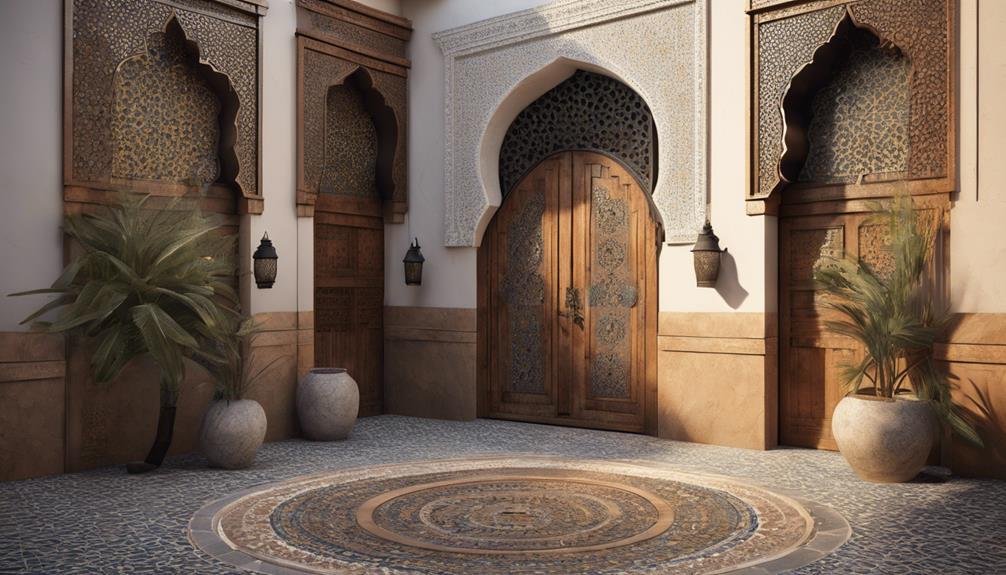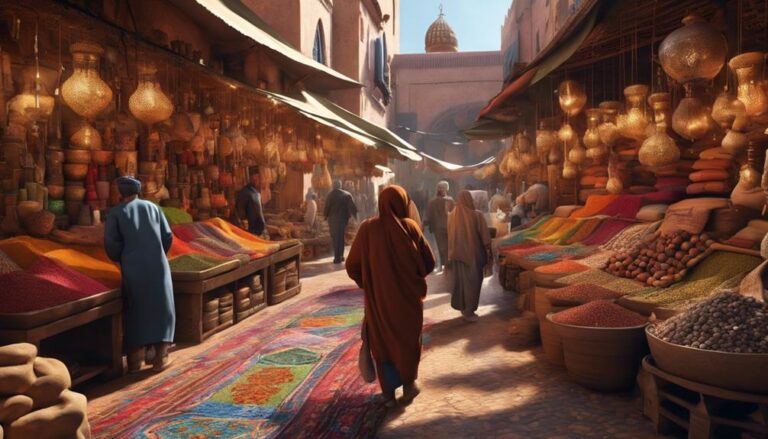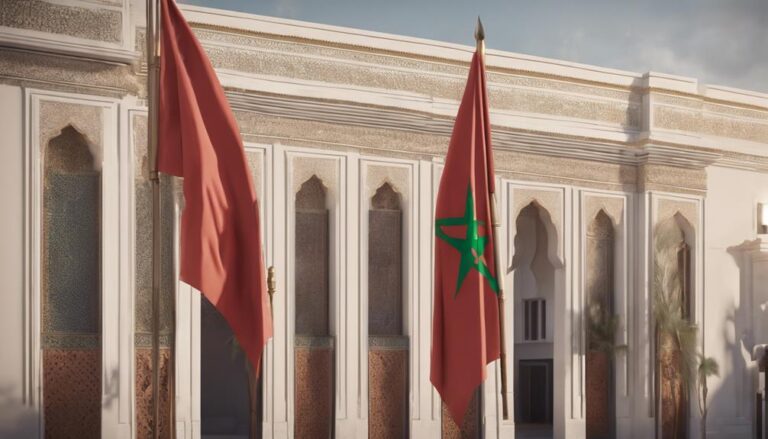In Morocco, antique laws stem from rich legal heritage influenced by culture and religion. These laws aim to protect cultural treasures by regulating the antiquities market and archaeological sites. Enforcement is strict, requiring permits for legal export from the Ministry of Culture. Violating laws results in severe penalties like fines, item seizure, criminal charges, and loss of ownership rights. The government, alongside international partnerships, plays an essential role in safeguarding Morocco's historical legacy. Discover the complexities of antiquities regulation in Morocco, a country where preservation efforts intertwine with enforcement measures and global cooperation.
Key Takeaways
- Moroccan antique laws require permits from the Ministry of Culture for legal export.
- Severe penalties, including fines and criminal charges, are imposed for not obtaining permits.
- The government enforces regulations to prevent illicit trafficking and unauthorized excavation of antiquities.
- Collaboration with international organizations aids in combating smuggling and preserving cultural heritage.
- Preservation measures include promoting responsible tourism, conservation efforts, and public education on heritage importance.
Historical Background on Antique Laws
In exploring the historical background of antique laws in Morocco, it's essential to thoroughly investigate the evolution of legal systems and societal norms that have influenced the foundation of these laws. The antique legislation in Morocco holds immense historical significance, reflecting the rich tapestry of the country's legal heritage. These laws have roots that extend deep into the history of Morocco, shaped by various cultural and religious influences over the centuries.
The development of antique laws in Morocco can be traced back to the ancient civilizations that once thrived in the region. Influences from Berber, Arab, and Islamic traditions have all played a role in shaping the legal framework of the country. The significance of these antique laws lies in their ability to provide insights into the societal norms and values that have prevailed throughout Morocco's history.
Legal Framework for Antiquities Protection
When examining the legal framework for antiquities protection in Morocco, it's important to understand the historical context that has shaped these laws.
The preservation of cultural heritage is a cornerstone of these regulations, aiming to safeguard Morocco's rich history and traditions.
Law enforcement mechanisms play a significant role in ensuring compliance and deterring illicit activities that threaten the country's antiquities.
History of Antiquities
During the historical evolution of Morocco, a comprehensive legal framework was established to protect and preserve its antiquities. The laws governing the antiquities market and archaeological sites in Morocco are essential for safeguarding the country's rich historical heritage.
The legal framework includes regulations that govern the sale, purchase, and export of antiquities to prevent illicit trafficking and preserve valuable artifacts. Additionally, laws protect archaeological sites from unauthorized excavation or damage, ensuring that these sites remain intact for future generations.
Cultural Heritage Preservation
The legal framework governing cultural heritage preservation in Morocco intricately weaves together regulations that meticulously safeguard the country's antiquities and historical treasures. When it comes to preserving Morocco's rich cultural heritage, several key aspects are vital:
- Cultural Tourism: Promoting responsible tourism that respects and enhances the cultural significance of historical sites.
- Conservation: Implementing measures to protect and maintain the physical integrity of antiquities and heritage sites.
- Heritage Education: Educating the public about the importance of preserving cultural heritage for future generations.
- Community Involvement: Involving local communities in heritage preservation efforts to ensure their active participation and benefit from these initiatives.
Law Enforcement Mechanisms
Preserving Morocco's cultural heritage relies heavily on the thorough legal framework in place to enforce antiquities protection measures. The law enforcement mechanisms for cultural heritage preservation in Morocco are extensive and stringent. The Ministry of Culture and other relevant authorities work diligently to monitor and regulate the trade, excavation, and movement of antiquities within the country.
To combat illegal activities, such as smuggling and illicit excavation, Morocco has implemented laws that require proper documentation and permits for the sale and transfer of antiquities. Additionally, penalties for violating these laws are severe, including fines and potential imprisonment. By strictly enforcing these regulations and collaborating with international organizations, Morocco aims to safeguard its rich cultural heritage for future generations.
Regulations on Antiques Trade
When considering the regulations on the antiques trade in Morocco, it's essential to understand the strict antique export restrictions imposed to protect the country's cultural heritage.
Dealers must adhere to stringent licensing requirements to engage in the trade of antiquities, ensuring transparency and accountability in the market.
Violations of these regulations can result in severe penalties, emphasizing the government's commitment to preserving Morocco's historical artifacts.
Antique Export Restrictions
To effectively navigate the regulations surrounding the export of antiques in Morocco, it's essential to understand the intricate laws that govern this trade. Antique smuggling is strictly prohibited in Morocco, and international trade restrictions play an important role in controlling the movement of valuable historical artifacts.
When dealing with antique export restrictions in Morocco, keep the following points in mind:
- Documentation Requirements: Ensure all necessary export permits and certificates are obtained.
- Restricted Items: Be aware of specific antiques that may be prohibited from leaving the country.
- Customs Procedures: Familiarize yourself with the proper procedures for declaring and shipping antiques.
- Penalties: Understand the consequences of violating antique export regulations to avoid legal repercussions.
Licensing Requirements for Dealers
Understanding the licensing requirements for dealers is essential when managing the regulations on the trade of antiques in Morocco. Dealers must comply with specific regulations to guarantee the authenticity and legality of the items being traded. Dealer registration is an important step, requiring individuals or businesses to obtain a license to engage in the buying and selling of antiques. Import restrictions play a significant role in controlling the entry of antiques into the country, aiming to protect cultural heritage and prevent illicit trafficking. Keeping up with market trends is crucial to avoid dealing with counterfeit goods that could harm the reputation of the antique trade industry. By following these licensing requirements, dealers contribute to maintaining the integrity of the antiques market in Morocco.
| Licensing Requirements | Description | Importance |
|---|---|---|
| Dealer Registration | Obtain a license to trade antiques | Ensures legality and authenticity |
| Import Restrictions | Control the entry of antiques into Morocco | Protects cultural heritage |
| Market Trends | Stay updated to avoid counterfeit goods | Maintains industry integrity |
Penalties for Violations
Failing to adhere to the licensing requirements for dealers in Morocco can result in severe penalties under the regulations governing the trade of antiques, particularly concerning violations related to the authenticity and legality of traded items. The government plays an essential role in enforcing these laws to guarantee the protection of Morocco's cultural heritage.
Penalties for violations include hefty fines, imprisonment, confiscation of illegally traded items, and revocation of trading licenses. The legal consequences for engaging in the illicit trade of antiques are strictly enforced to deter unlawful activities and preserve the historical significance of these artifacts.
The government's active involvement in monitoring and regulating the antiques trade demonstrates a commitment to upholding the country's cultural heritage and preventing unauthorized dealings in valuable historical items.
Export Restrictions and Permits
When exporting antique items from Morocco, it's important to be mindful of the specific export restrictions and permits that may apply to guarantee compliance with the law. Morocco has strict import regulations to protect its cultural heritage from smuggling activities. The illicit trade of antiquities contributes to the growth of the black market, where priceless artifacts are often sold illegally. To combat this, Moroccan authorities have intensified their enforcement efforts, implementing measures to monitor the export of antiques and prevent their unlawful removal from the country.
To legally export antiques from Morocco, individuals must obtain the necessary permits from the Ministry of Culture. These permits ensure that the items being exported are authentic, legally acquired, and not of significant national importance. Failure to secure the required permits can result in severe penalties, including fines and confiscation of the items. By adhering to the export restrictions and obtaining the proper permits, you can make certain that your antique transactions are lawful and contribute to the preservation of Morocco's rich cultural heritage.
Penalties for Violating Antique Laws
Violating antique laws in Morocco can lead to substantial fines, confiscation of items, and potential legal repercussions, underscoring the importance of compliance with regulations. The legal consequences of breaching antique laws are severe due to the cultural significance of these items. Enforcement measures are in place to guarantee the preservation of Morocco's rich heritage and prevent illicit trafficking of antiquities.
Here are some penalties for violating antique laws in Morocco:
- Fines: Individuals found guilty of violating antique laws may face hefty fines as a deterrent.
- Confiscation: Authorities have the right to seize any items involved in the violation of antique laws.
- Legal Repercussions: Violators could face legal actions, including criminal charges or civil suits.
- Loss of Ownership Rights: In some cases, individuals may lose ownership rights over the antiquities involved in the violation.
These penalties underscore the seriousness with which Morocco treats the protection of its cultural heritage and the enforcement of antique laws.
Role of Government in Enforcement
The effective enforcement of antique laws in Morocco relies heavily on the government's essential measures to safeguard the country's cultural heritage and combat illicit activities related to antiquities. Government involvement in enforcing these laws is vital to prevent the illegal trade and trafficking of valuable artifacts. The Moroccan government has established specific enforcement mechanisms to regulate the sale, purchase, and export of antiquities. These mechanisms include strict licensing requirements for antique dealers, regular inspections of archaeological sites and museums, and the implementation of penalties for those found in violation of the laws.
Moreover, the government works closely with law enforcement agencies, such as the Moroccan police and the National Security Service, to investigate and prosecute individuals or groups involved in the illicit trade of antiquities. By collaborating with these entities, the government can effectively monitor and enforce compliance with the antique laws. Additionally, public awareness campaigns and educational programs are conducted to inform the population about the importance of preserving Morocco's cultural heritage and the consequences of engaging in illegal activities related to antiquities. Through these concerted efforts, the government plays a pivotal role in safeguarding the country's rich historical legacy.
International Cooperation on Antiques
International collaboration enhances the effectiveness of enforcing antique laws by fostering mutual support and coordination among countries. When it comes to combatting antique trafficking and antiquities smuggling, cross border cooperation plays a vital role in preserving cultural heritage. Here are some key aspects of international cooperation on antiques:
- Information Sharing: Countries share intelligence on illicit activities related to antiques to prevent smuggling and trafficking.
- Legislative Alignment: Harmonizing laws and regulations across borders helps create a unified front against illegal trade in antiquities.
- Joint Operations: Collaborative efforts in conducting raids and investigations increase the chances of apprehending individuals involved in illicit antiquities trade.
- Capacity Building: Supporting countries with limited resources in developing their expertise and infrastructure to better address the challenges of protecting their cultural heritage.
Challenges in Preserving Heritage
Preserving heritage poses significant challenges in safeguarding cultural artifacts and historical sites from illicit activities that threaten their integrity and existence. One major challenge is the lack of financial resources for proper conservation efforts. Without adequate funding, it becomes difficult to implement preservation techniques effectively. Additionally, the lack of awareness and education about the importance of heritage conservation can lead to apathy towards protecting these valuable assets.
| Challenges | Preservation Techniques |
|---|---|
| Insufficient funding | Implementing fundraising campaigns and seeking grants for conservation projects. |
| Lack of public awareness | Conducting educational programs and awareness campaigns to highlight the significance of heritage preservation. |
| Climate change effects | Utilizing climate control systems in museums and historical sites to mitigate the impact of environmental changes. |
Addressing these challenges requires a multi-faceted approach that involves collaboration between government entities, non-profit organizations, and the public to safeguard Morocco's rich cultural heritage for future generations.
Future of Antique Laws in Morocco
In considering the future of antique laws in Morocco, it's essential to evaluate the effectiveness of current regulatory frameworks and explore potential enhancements to guarantee the protection and preservation of the country's cultural heritage. To ascertain the continued safeguarding of Morocco's rich historical treasures, several key factors need to be taken into account:
- Technology Advancements: Embracing technological innovations can revolutionize the way antiquities are preserved and maintained.
- Conservation Efforts: Strengthening conservation practices and investing in restoration projects are vital for the longevity of Morocco's antique laws.
- Public Awareness: Educating the public about the importance of preserving cultural heritage can garner support and foster a sense of responsibility towards safeguarding antiquities.
- Heritage Tourism Opportunities: Leveraging Morocco's historical sites for heritage tourism can't only boost the economy but also create incentives for the protection of antique laws.
Conclusion
You've explored the intricate world of Morocco's antique laws, uncovering the legal framework, regulations on trade, and penalties for violations.
Did you know that Morocco signed the UNESCO Convention on the Means of Prohibiting and Preventing the Illicit Import, Export and Transfer of Ownership of Cultural Property in 1970? This reflects the country's commitment to preserving its rich heritage and collaborating internationally to protect antiquities.
Keep investigating the fascinating domain of antiquities in Morocco!

The Editorial Team is a passionate group of Morocco enthusiasts dedicated to sharing the beauty, culture, and wonders of this captivating country. With diverse backgrounds and a deep love for travel, we strive to bring you engaging and informative content that inspires your Moroccan adventures. From uncovering hidden gems and sharing local insights to exploring mouthwatering cuisine and showcasing the vibrant lifestyle, our team is committed to providing you with valuable resources and exciting stories that enhance your exploration of Morocco. Join us on this journey as we celebrate the rich heritage and unforgettable experiences that make Morocco truly special.







